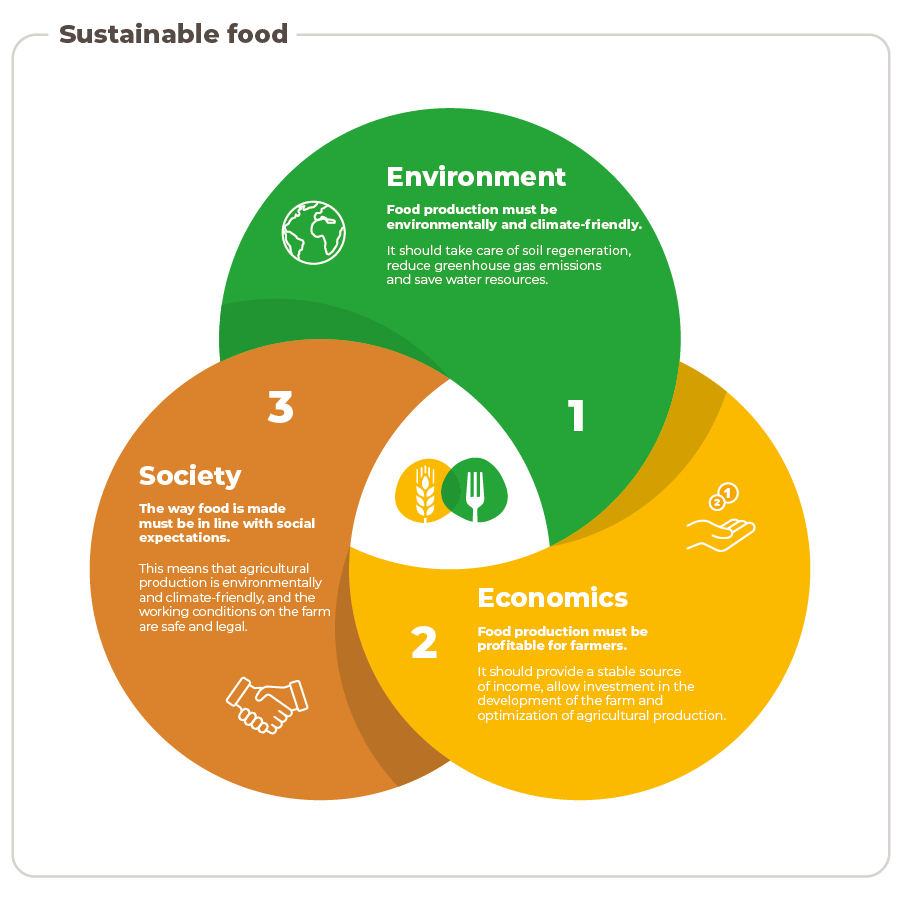Sustainable food is a product of sustainable agriculture. It is a publicly accepted model of agriculture that cares about the environment and the farmer’s finances.
We talk about sustainability only if the production process of such food follows three principles: it is environmentally and climate-friendly, it is economically justified and it is socially acceptable.
The main principles of the sustainable agriculture model are to reduce the adverse impact of agricultural production on the environment and to use the available resources more efficiently. These include the way farmers use soil, water, energy, machinery, plant protection products and fertilizers or seeds. At the same time, however, the profitability of agricultural production for agricultural producers themselves and the selection of practices, methods and tools of cultivation or animal husbandry that do not raise social objections are also essential elements of sustainable agriculture. The most frequently mentioned in this context are: care for animal welfare and preservation of biodiversity around the farm, reducing greenhouse gas emissions, economical water management and the use of cultivation methods that do not degrade the soil. A list of the most important sustainable farming practices can be found on this page.

Sustainable food
- Environment. Food production must be environmentally and climate-friendly. It should take care of soil regeneration, reduce greenhouse gas emissions and save water resources.
- Economy. Food production must be profitable for farmers. It should provide a stable source of income, allow investment in the development of the farm and optimization of agricultural production.
- Society. The way food is made must be in line with social expectations. This means that agricultural production is environmentally and climate-friendly, and the working conditions on the farm are safe and legal.
However, the use of appropriate cultivation and breeding methods by farmers is only one element of sustainability. Agricultural products very often go to processors and then to stores, which are the next stages on the path of food from the farmer to the consumer. Both processors and suppliers apply the principles of sustainability in the production, packaging and transport stages. These include shortening supply chains, which allows you to source agricultural raw material from local farmers and deliver it to local shops – which reduces exhaust emissions from transport and supports local business, reducing water consumption and greenhouse gas emissions, and using recyclable packaging. Processors and other participants of the sustainable food chain also provide direct support to farmers who have introduced the sustainable farming model on their farms. They are very often so-called cultivation contracts that guarantee farmers the sale of agricultural products. In addition, farmers cooperating with companies from the agri-food sector receive access to training, advice or support in the process of certification of the farm in terms of sustainability.
Agriculture and food production are at the heart of climate and social change, resulting in a growing focus on green investment both in agriculture itself and in the agri-food sector as a whole. The sustainable food production model allows companies to adjust their strategies to the current challenges and requirements while maintaining long-term production stability and competitiveness.
There are several certification schemes on the market that allow food companies to assess, improve and validate the sustainability of farms in their supply chains. For crop production these are the Farm Sustainability Assessment (FSA) and GLOBALG.A.P with the FSA appendix, which are currently the main tools for the sustainable food production certification and the Integrated Plant Production certification. For animal husbandry production these are e.g. Quality Assurance for Food Products, Animal Welfare Approved, Red Tractor, or standards created as a part of Global Roundtable for Sustainable Beef, European Roundtable for Beef Sustainability. More information about the types of certification can be found on this page.
Currently, there is no single common standard for sustainable food labeling on the Polish market, as is the case with organic food. It happens, however, that producers include information, e.g. on packaging about the food coming from sustainable agriculture.
